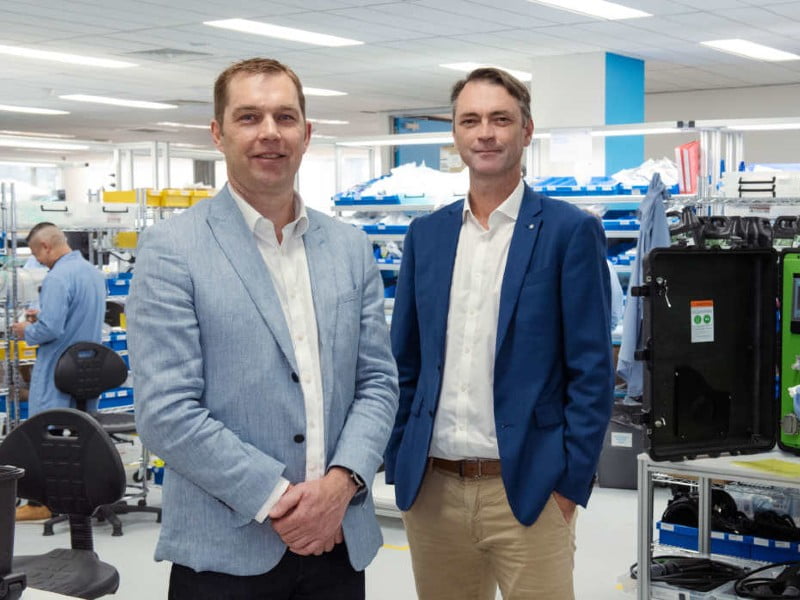The medtech company partnering with the Victorian government to establish a rapid antigen test manufacturing plant hopes to eventually use the base to supply the nation with the much-needed product.
The Victorian government on Wednesday announced a partnership with Lumos Diagnostics and Planet Innovation to launch a $17.2 million manufacturing facility and innovation hub in Victoria to produce Covid-19 rapid antigen tests and other diagnostic products.
Once it’s fully up and running by October, the facility will produce up to 50 million rapid antigen tests (RATs), with priority access to these tests given to the Victorian government.

Lumos Diagnostics is currently manufacturing RATs and exporting them to North America and Europe, with the company still waiting for approval from the Therapeutic Goods Administration (TGA) to begin using them in Australia.
Lumos Diagnostics executive chair and Planet Innovation co-CEO Sam Lanyon said the company has been in discussions with the Victorian government since before the pandemic, and approached both the state and federal governments in 2020 for the local manufacturing of Covid-19 RATs.
“We’ve been working with the state government for a long time. We’ve got a relationship with them, and that has been really positive. We find that they get what we do and understand how we’re a catalyst for building the medtech ecosystem here in Victoria,” Mr Lanyon told InnovationAus.
“As the pandemic evolved we were having ongoing conversations with the Victorian and federal governments. Sometimes there’s a right time and a wrong time to have conversations, but at the end of the day as long as the conversations are constructive and people are aware of you, [then] when there’s a changing situation in public health they know who to reach out to.”
The federal government has not provided any funding to the Victorian RAT manufacturing facility, but Mr Lanyon said he is hopeful the Commonwealth will procure tests from the local company.
“The funding part is not as important to us as the procurement part. I would fully expect that when we have product available here locally then we’d have conversations about national procurement as well as the state government procurement,” he said.
“What we’re focusing on is certainty of procurement. Part of the deal is that it’s starting to be part of that framework with the Victorian government. We’d love to do things similarly with other states and we look forward to doing that.”
The facility will be locked in Blackburn, while initial production of RATs will begin from April at Planet Innovation’s existing plant.
The company will manufacture one million tests a month from April, three million per month after July and the full amount of 50 million per month from October onwards.
The partnership makes Victoria the first state to be pushing the local manufacturing of RATs with direct funding and support.
“Manufacturing rapid antigen tests in Victoria will protect and secure the state’s supply chain and create local jobs. Being able to scale up production so quickly shows the strength of Victoria’s advanced manufacturing capabilities,” Victorian Premier Daniel Andrews said.
There are a number of Australian RAT manufacturers currently waiting for TGA approval, with many of these opting to export the tests overseas while they want.
The federal government last month procured $60 million-worth of RATs from overseas.
The federal Opposition recently pledged to increase the sovereign manufacturing of medical equipment and to give priority to locally-made goods when purchasing under an election pitch focused on RATs.
After rule changes late last year allowed for rapid diagnostic tools such as RATs to be used at homes, Lumos Diagnostics has been waiting for approval from the TGA for its tests.
“We continue to work with the TGA on building our application and hopefully there’ll be some good news in the future,” Mr Lanyon said.
The Victorian facility will be manufacturing a range of rapid diagnostic tests, not just Covid-19 ones, and is a long-term play from the government, Mr Lanyon said.
“The process with the local regulators has been as expected and the same as elsewhere in the world.”
“This sovereign manufacturing capability is not just about one product for a short period of time. Our intention is to expand it in terms of our ability to produce products for Australia and internationally,” he said.
“Sovereign capability is important not just in our space, it’s broadly really important from a defensive perspective. If you believe that some parts of healthcare are defensive in nature, then that’s the area you should have local capability. Global supply chains are naturally going to get stretched so we need to build up local capability.
“This is a long-term play, it doesn’t get solved overnight.”
Do you know more? Contact James Riley via Email.

